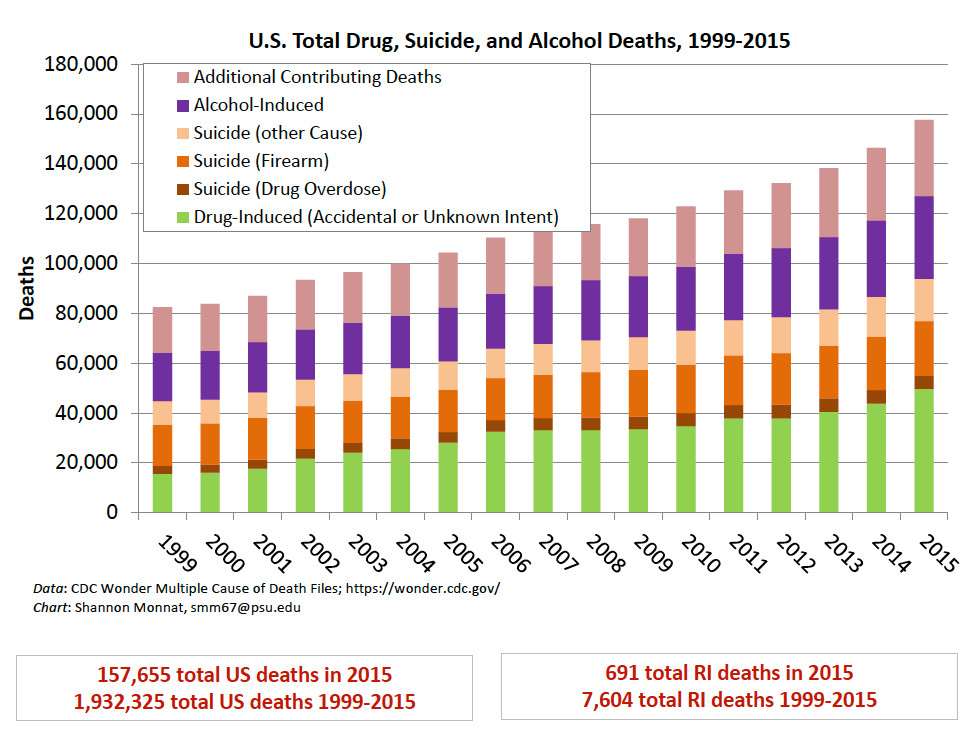To create a new dawn, a new day, and a new life in recovery
As the research by Shannon Monnat gains new traction nationally, how will the Governor’s Task Force respond?
The bottom line is about dignity and respect in work: providing jobs with good wages and an opportunity for advancement, with a safe, affordable place to live, and not the prospect, as Reel Big Fish once sang, “Well, I know you can’t work in fast food all of your life.”
PROVIDENCE – In the last week since Shannon Monnat gave her talk on Oct. 27 at Rhode Island College on the “Landscapes of Despair,” her work focused on redefining the epidemic of overdose deaths as a crisis related to social disintegration and economic decline has attracted more national attention.
The recent Business Insider story, published on Nov. 3, featured Monnat’s research findings, which incorporated an economic distress index, measuring the percentages of people who are in poverty, unemployed, disabled, in single-parent families, living on public assistance, or living without health insurance. These same places had exceptionally high rates of drug overdoses and deaths.
Further, Monnat’s research has combined the mortality statistics for drugs, alcohol and suicide, labeling them the “deaths of despair.”
In the Business Insider story, Monnat critiqued President Donald Trump’s plans as part of declaring a public health emergency to expand enforcement, implement drug courts and pursue a “just say no” advertising campaign for not addressing the underlying causes.
“One of the things with President Trump’s announcement and the opioid commission’s forthcoming recommendations is that they’re very treatment based,” she told the reporters. “They focus almost exclusively on keeping addicts from dying rather than keeping people from falling into addiction to begin with.”
What will be the Rhode Island response?
This week, on Wednesday, Nov. 8, the Governor’s Task Force Overdose Prevention and Intervention will convene its monthly meeting, with the bulk of the agenda focused on a presentation by Brandon Marshall on tracking the metrics of the overdose epidemics, followed by a “Dashboard Data Challenge,” in which members of the Task Force have been asked to review the data pages and offer suggestions how the interactive data might be more useful to their work.
One of the discrepancies that may come up in the discussion around the data is the fact that six-month totals from confirmed overdose deaths in Rhode Island in 2017 are listed as 157, according to the R.I. Department of Health website, and 172 on the Prevent Overdose Rhode Island, or PORI website. Which is accurate? Why the discrepancy?
[Editor's note: a R.I. Department of Health spokesman told ConvergenceRI on Nov. 6 that the apparent discrepancy was due to a data posting error on the PORI website and that it had now been updated.]
[Another data point of contention: the news releases from Sen. Sheldon Whitehouse’s office, including the latest issued on Sunday, Nov. 5, keep referring to 326 overdose deaths in 2016, while the actual number is 336.]
Who will bring up Monnat’s research?
A 20-minute public comment section at the end of the Task Force meeting has been scheduled, when it is possible that members of the Task Force, including Sen. Josh Miller, may bring up the talk by Monnat and her research findings, which Miller called one of the most valuable he had seen in a long time.
Another potential point of conversation and question is the status of the harm reduction strategy recommendations, which were part of the new executive order signed by Gov. Gina Raimondo in July, with a planned schedule to introduce such strategies in November. To date, however, no document outlining proposed harm reduction strategies to be undertaken by the Task Force has been released publicly.
Jumpstarting the conversation on harm reduction
To help jumpstart the conversation around harm reduction strategies, RICARES, the voice of the recovery community in Rhode Island, has produced the second part of a comprehensive report to the community, which it will release on Monday, Nov. 6.
In the second report, RICARES reviews new actions taken by the Task Force as well as adding perspective on some of the problematic aspects of the present treatment landscape.
The second report includes a range of specific recommendations to enhance and expand the existing harm reductions efforts.
Among the recommendations put forward in the report:
• A clear definition of what harm reduction means, in order to remove misunderstanding and confusion around the term.
• The inclusion of patients in medication assisted recovery and active users in the community in the discussion around harm reduction.
• The development of additional strategies that focuses on primary prevention, treatment and recovery for women.
The report argued: “There is no cohort with substance use disorders whose condition is more severe and complex than women with Opioid Use Disorder. If we want to assure the continued intergenerational cycle of addiction, we should continue to use the same treatment model for women as for men. If we want to assure the continued cycle of intergenerational trauma, we should continue to use the same treatment model for women as for men.”
• The development of supervised consumption sites in Rhode Island, which would include the presence – but not forcing of – treatment exposure and related resources.
The report also mentioned that Brown’s Brandon Marshall is leading a study in which he and his team have asked 90 participants to test their drugs for the presence of fentanyl, using special test strips, and to report back their findings.






